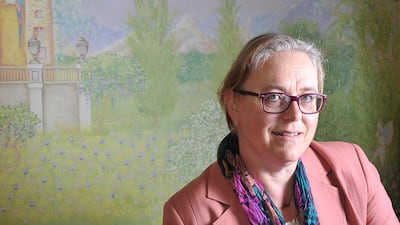ABU DHABI // Parents’ belief that autism is not something that will happen to their children and their lack of knowledge about it is leading to late diagnosis, experts warn.
Identifying the problem earlier can help the child’s development and education, paediatricians agree.
“We usually think the child probably has had symptoms for at least one year, or significant symptoms for a year, most often before parents realise there is something,” said Dr Eeva-Liisa Langille, a consultant at Burjeel Hospital in Abu Dhabi.
Autism is a range of developmental disorders, the effects of which include difficulty with social interaction and communication.
Some parents become anxious when their child is between one year and 18 months old and they realise they are not learning, said Dr Langille, from Australia.
In other cases the child can be between two and three years old before parents realise they are not behaving like their peers.
“Some children have the symptoms but parents don’t realise to put together the symptoms and signs to suspect anything like that, or they haven’t heard of autism,” Dr Langille said.
“At two years, it’s most often rather obvious and that’s the optimum time of starting treatment, because we are on a timeline that a child needs to have an efficient way of communicating by the age of three, otherwise it’s going to be difficult to learn any more.”
Delays in identifying autism is a global problem, she said.
“It depends on the parents’ level of education and their understanding.”
Autism is a spectrum of disorders, including Asperger’s syndrome, which have symptoms ranging from very mild to severe.
The World Health Organisation estimates one in every 160 children has an autism disorder, although prevalence varies substantially in different studies.
“Sometimes when we tell them that their child has some autistic symptoms they deny it until a late stage,” said Dr Maha Darwich, a paediatrician at Dr Sulaiman Al Habib Medical Centre in Dubai.
“Many of the children, the parents do not realise until they go to the nursery or kindergarten.”
Awareness of the disorders is improving in the UAE but must spread further, said Dr Darwich, from France.
Signs to watch for include difficulty having eye-to-eye contact with a child that has reached its first birthday, or the child not responding to its name by that stage.
Another possible sign is when the child does not use any meaningful words beyond reference to their mother and father by the time they are 18 months old.
Dr Harpreet Saini, a consultant in family medicine at the capital’s Healthpoint hospital, agreed the problem of late diagnosis is global.
“Parents are probably slower to take the child to see somebody because perhaps they are not aware it could be autism,” said Dr Saini, from Britain.
“Or they think whatever it is might get better with a bit more time, or they think their child is just a bit slow and might catch up, or he might outgrow whatever behavioural issue is presenting.
“Research studies have shown that earlier diagnosis and intervention actually improve the outcome for children with autism.”
There is no cure but there are treatments that can help, including behavioural therapy, such as teaching a child how to concentrate or dress themselves, and special education plans put together by trained therapists.
Medication may also be recommended to help with problems such as severe aggression.
“Behavioural therapies take time so if they only get worried in August, when the child starts school in September, there’s not enough time to do that,” Dr Langille said.
“Then you are almost pushing the child into failure at school or the school into failure because they are not prepared to help that child.”
If there is poor communication between teachers and parents or the school is not equipped to help, the child can fall out of the education system, she warned.
ecleland@thenational.ae

